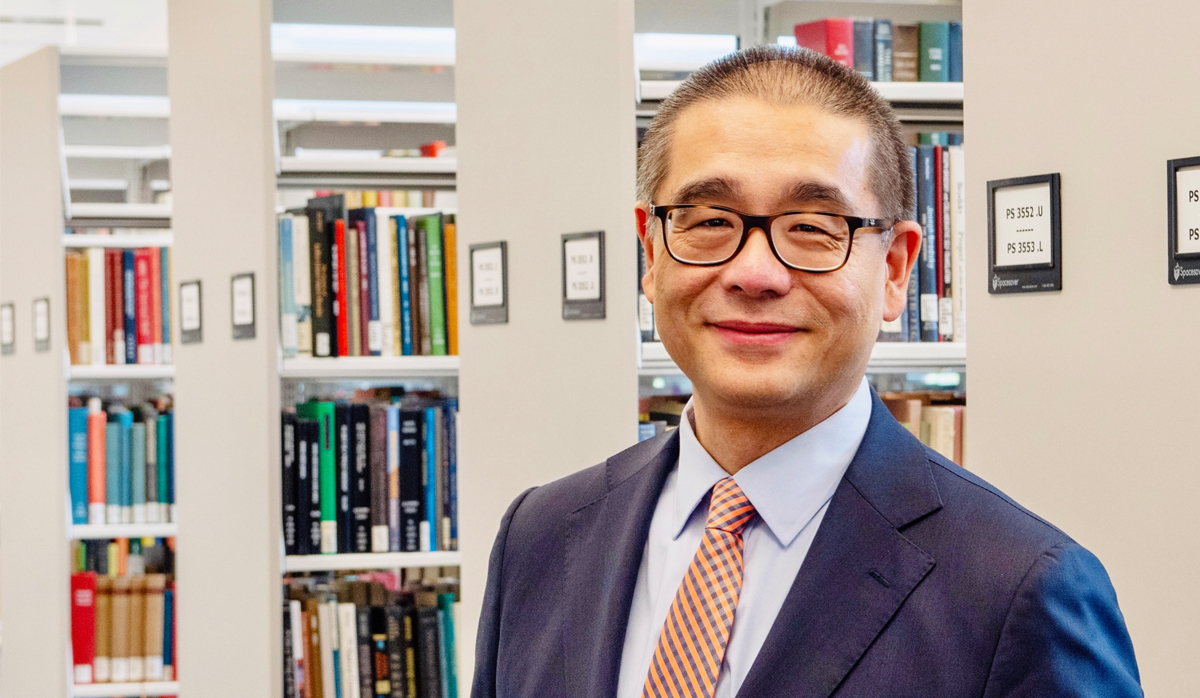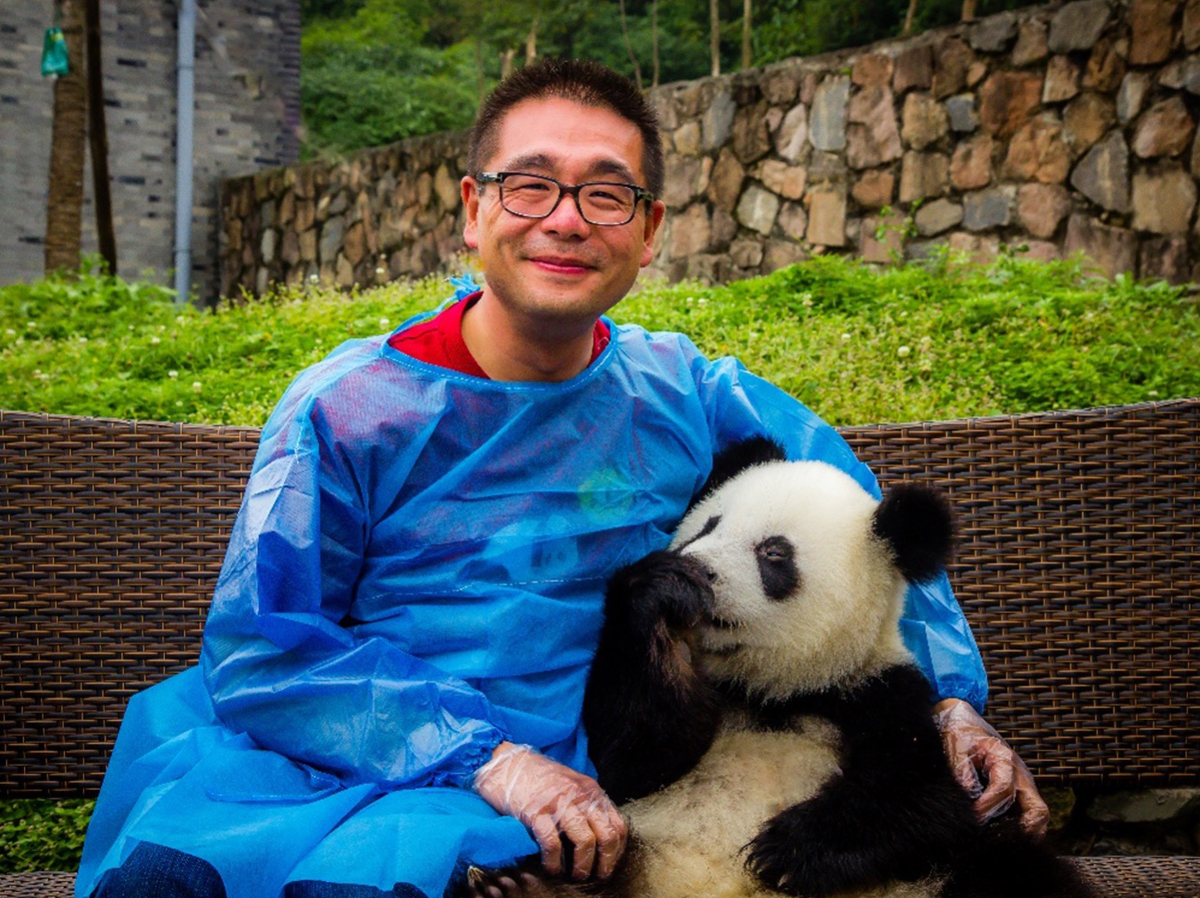
On September 15, 2025, the Library welcomed Leo Lo as the University of Virginia’s University Librarian and Dean of Libraries. Lo is the 17th individual in this role. He is also a professor in the School of Education and Human Development and holds an appointment as Advisor to the Provost for AI Literacy.
Lo comes to UVA after having spent the past 15 years in leadership roles at university libraries, most recently at the University of New Mexico. At UNM he directed the University Libraries, UNM Press, and the Organization, Information & Learning Sciences academic programs, supporting open education, data-driven library services, and AI literacy. Prior to UNM, he was associate dean at Pennsylvania State University Libraries. He has also just completed his term as the 2024–25 president of the Association of College and Research Libraries.
We were eager to get to know Dean Lo and to share some of his background, passion, perspective, and ideas, and he kindly answered our questions below.
Q: Can you start by telling us just a little bit of your life’s story?
A: I was born in Hong Kong, educated in England, came to the U.S. for college, and later returned to Europe to start my own businesses. Moving across cultures taught me adaptability and resilience; building businesses gave me the confidence to set bold goals and pursue them with focus. Those experiences shaped my personal mission: to live with purpose, to keep growing, and to help others succeed. That’s also the vision I hope to bring to UVA Library — to be ambitious together, to set meaningful goals, and to turn them into progress for our students, faculty, and staff.
Q: On your personal website, you share your mission: To live a fun, purposeful, and extraordinary life, and make a positive contribution to the world by inspiring and empowering others to do the same. How do you plan to do this at UVA Library?
A: My mission has been pretty steady for a long time: to live a fun, purposeful, extraordinary life, and to help others do the same. That sounds simple, but a few years before my 40th birthday, I realized I was drifting. I had ideas about the life I wanted, yet nothing to hold me accountable.
So I gave myself a challenge: the “45 Before 45 Project”: I made a list of 45 things I wanted to accomplish before turning 45. Having a deadline changed everything. It meant I couldn’t keep saying “someday.” I had to act.

Some of the goals were serious, like reclaiming my health after years of neglect. Others were playful, like holding a baby panda while wearing a panda T-shirt, or jumping out of a plane on my 41st birthday. 😊

And some were deeply personal, like traveling to my parents’ hometowns in southern China to better understand them, and myself.
The truth is, I didn’t finish all 45. But that wasn’t the point. The project gave me a vision, and vision gave me momentum. Setting goals, whether ambitious or silly, pushed me to live with more intention. It gave me discipline and perspective, and reminded me that progress matters more than perfection.
That experience shaped how I see leadership. I would love to see UVA Library carrying that same spirit. A place where students, faculty, and staff are encouraged to imagine more for themselves, and to feel supported as they pursue it. For students, that might mean experimenting with new ideas or technologies. For faculty, it might mean having a Library partner who helps advance groundbreaking research. For staff, it should mean having the safety and trust to grow, to take risks, and to play a role in shaping the Library’s future.
My vision is for UVA Library to do more than serve the University. I want it to inspire the University. If people walk away from here feeling braver, more capable, or more inspired than when they arrived, then we’re not just talking about a mission. We’re living it together.
Q: As AI continues to evolve and become more integrated into higher education, how should UVA Library stay informed and involved?
A: I came into librarianship because of what was then the big transformative technology — the internet. It was exciting but also overwhelming at times. It completely changed our profession. It changed the world. I think back to those early days: digitization, online catalogs, electronic journals. Some people jumped in right away, some were cautious, some resisted. But eventually, we all had to adapt.
We’re in a very similar place now with AI. It’s another inflection point. And just like before, the world around us isn’t going to wait for us to figure it out at our own pace. Library users are already engaging with it. Faculty are experimenting in their teaching, students are trying it out for their assignments, researchers are asking how it fits into their work. If they need help, if they need guidance, then we as the Library need to be there. That’s our job.
Now, I want to be clear: I believe in AI’s potential, but I also see its limitations and drawbacks. I don’t expect Library staff to be evangelists for AI, but I do hope we’ll all become AI literate. And here’s why: whether a person is excited about AI or deeply skeptical, being literate in it only makes your voice stronger. If you embrace it, literacy helps you use it more effectively and responsibly. If you see its flaws, literacy gives you sharper arguments and a stronger voice in shaping the conversation.
When it comes to AI, everyone is learning right now. Even the people building these systems admit they don’t fully know where things are heading. That can feel unsettling, but I actually think it’s liberating. We don’t have to wait to be “experts” before we start. We can explore, we can share what we learn, and we can support each other along the way.
Second, I hope to make the Library a hub for AI conversations at UVA. The Library has a unique role — it is trusted across disciplines. That means the Library can bring people together: engineers and historians, data scientists and poets, all asking what AI means for their work.
And finally, I want to hold on to what makes libraries special — our values. We don’t adopt technologies just because they’re shiny and new. We approach them thoughtfully. That’s why people trust the Library, and that’s how we’ll stay trusted through this next wave of change.
Q: Can you talk about the role of academic libraries in workforce development? How can libraries help students be better prepared for their careers?
A: When people hear “workforce development,” they don’t usually think of libraries. They might picture a career center or internships.
But in reality, libraries have been doing workforce development all along. Every time we help a student shape a research question, evaluate information critically, or learn a new tool, we’re giving them skills they’ll carry into their careers.
What’s different now is the pace of change. The world our students are stepping into is shifting quickly, especially with AI. Many of the jobs they’ll have in five or ten years don’t even exist yet. That uncertainty could feel daunting, but it’s also why libraries matter more than ever. What we do best is help people adapt, keep learning, and stay confident when the ground is shifting.
One can see it every day here: different majors all in the same space. Few other places at UVA bring such a mix together. That gives us a special opportunity to help students build “future-proof” skills like critical thinking, information literacy, ethical reasoning, and now, AI literacy.
It’s not only about skills, though. It’s about mindset. Libraries can model what it means to be curious, to experiment, to take risks in a safe environment. When students see this as a place where they can try, fail, and try again, they’re learning the habits that will carry them through a lifetime of change.
Q: You have many academic degrees, including Doctor of Education in Higher Education Management, an M.S. in Information Studies, a M.F.A. in Screenwriting (from Hollins University), and a M.A. in Survey Research. How do you use these degrees in your work? And does the screenwriting degree come into play at all?
A: When I first went to Hollins University, my plan was not to become a librarian at all. I was going to be a film scholar. I imagined a quiet life of watching films, writing about them, and avoiding too much interaction with people. That sounded safe.
But the program required me to take at least one screenwriting class. And that terrified me, because screenwriting meant sharing my work out loud and getting critiqued in front of everyone. I almost didn’t enroll because of that requirement.
Therefore, I decided to just “get it over with” that first summer. And when I actually took the class, something surprising happened. Yes, it was uncomfortable, yes, my comfort zone got stretched — but every time I put my work out there, I grew. I started to enjoy the creativity. I even discovered that I loved telling stories.
However, loving storytelling didn’t mean I wanted to go to Hollywood. That wasn’t my path.
Therefore, I started to ask myself: What am I really learning here? And what I realized is that screenwriting was teaching me how to listen, how to take criticism without shrinking, and how to step into someone else’s shoes. Those skills had nothing to do with film, but everything to do with leadership.
At the time, I still didn’t know librarianship existed as a career.
When I stumbled across library science through a conversation with a professor, it clicked. Librarianship was a field that combined curiosity, creativity, and service. And I brought with me not just my library science training or later my doctorate in higher education, but also the lessons I had learned in the screenwriting workshop: how to build empathy, how to tell a compelling story, how to give and receive feedback in ways that make everyone’s work stronger.
And that’s why today, even though people look at my MFA in Screenwriting as the “odd one out” in my academic path, I probably draw on it more than any of my other degrees. Because leadership isn’t just about charts and data — it’s about persuasion, empathy, and storytelling. In screenwriting I learned how to weave those together, and in librarianship I use them every single day.
Q: What are some of your favorite books and why?
A: I’ll admit I haven’t had as much time for fiction in recent years as I’d like. And I regret that. Making more time to read just for pleasure is one of my goals going forward.
I enjoy a good science fiction. “The Martian” is a recent favorite. It’s funny, technical, and all about resilience and problem-solving. “The Remains of the Day” is an all-time favorite. I love its tone, and its quietness. But it’s incredibly powerful in the way it explores choices and regrets. I’ve also always enjoyed Murakami’s short stories (more than his long novels), and the martial arts novels of Jin Yong, which I grew up with in Hong Kong.
On the nonfiction side, I tend to look for books that shape how I think about work and leadership. “Bird by Bird” by Anne Lamott is one I come back to — I have it in paperback, Kindle, and Audible! It’s about writing, but also about life, taking things step by step and keeping a sense of humor. Right now, I’m listening to the biography of Lee Kuan Yew, which I find fascinating because of how he combined vision and pragmatism in leading Singapore. And “Prediction Machines” has influenced how I think about AI — it reframes AI not as magic, but as a prediction tool, which makes its opportunities and limitations much clearer.
Q: What are you curious to learn more about at UVA and/or the UVA Library?
A: I’m curious about where UVA Library is already having the greatest impact, and where we have the potential to do even more. I want to understand what staff are most proud of, what challenges we face, and how the wider University community sees us today. My goal is to take that understanding and help shape a vision for what comes next — how we can position the Library not only as a vital service, but as a driver of innovation, learning, and future readiness at UVA.
